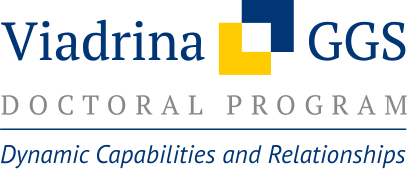Submitted on 01/15/2021
Top-level expertise, a spirit of cooperation and some caffeine - Prof. Dr. Martin Eisend is one of the most research oriented business academics in Germany
Prof. Dr. Martin Eisend is one of the most research oriented business researchers in Germany. In a ranking of the business news magazine WirtschaftsWoche, he takes the 13th place out of more than 3,000 academics for his achievements in the last five years and the 19th place overall for his research performance to date. In the interview with the press office, the marketing professor talks about good research conditions at the Viadrina and his most exciting research project.
Mr Eisend, the WirtschaftsWoche listed you under the top 1 percent of researchers in the field of business administration. What distinguishes your research performance?
The ranking is based on the number of publications in peer-reviewed journals. According to the quality of the journal, researchers received points for each publication. Just as publishing actively, it is as well important to place as many publications as possible in the leading journals of the discipline. I am very pleased about the good placements in both rankings.
What questions does your research address?
I focus on explaining consumer behavior. I am also interested in the portrayal of minorities - for example ethnic minorities or homosexuals - and of stereotypes in advertising - for example "housewives" versus "businessmen". My research is increasingly concerned with questions of social responsibility of marketing, especially in advertising and marketing communication. I have also developed a special methodological expertise in meta-analyses, which I use in many of my projects.
What is the most exciting research project you have worked on during the ranking period?
There have been many exciting projects in the last five years, such as on the effect of homosexual imagery in advertising or on the question of why consumers buy counterfeit brands. The most interesting project is one that I have been working on for several years with colleagues from Spain, France and the USA. It is about the effect of caffeine on shopping behavior. In several experiments, we were able to show (and to explain) that (and why) consumers spend significantly more money on shopping after drinking a cup of coffee (often over 40% more money). If you enjoy drinking coffee: watch out when shopping!
How do you balance between teaching and other commitments at the university on one hand and research on the other?
There is probably no universal recipe, but I believe that my research productivity has benefited a lot from experience and a specialized research expertise, from a strong network, but also from the specific conditions at the Viadrina. Experience and expertise with regard to certain topics, theories and especially methods that one accumulates over the years make the research process more efficient. In addition, most of my research projects are based on cooperations with experienced, skilled, highly committed and also very likeable colleagues from all over the world.
What are the special conditions at the European University?
Compared to other universities, the Viadrina is a university that leaves a lot of room for individual research and offers excellent conditions for a good balance between research and all the other academic obligations. Researchers at the Viadrina can develop their very specific interests and expertise without the massive pressure to produce results quickly or without being pushed towards certain topics, which is a common situation at many other universities in Germany and abroad.
How do you pass on your joy of research to the Viadrina students?
When I talk about my own research projects in my lectures, I am often amazed at how high the students' interest is and how many exciting and inspiring questions they ask. Participating in seminars and project groups also motivates students to deal with current research topics. Master’s theses, which at our department are always empirical research projects, can nourish the joy of research too. Students often discover their enthusiasm for research in these projects. I am pleased when some of them find their way into academia. But many who choose the professional practice also benefit from their first independent research experiences.
